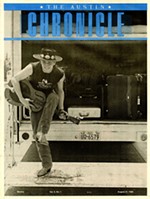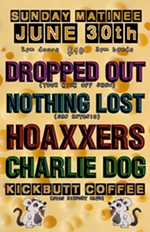The Guy Is Everywhere
Lloyd Maines
By Lee Nichols, Fri., Nov. 8, 1996
But with Maines, comparison to Day seems especially fitting. How important is Day? Let's put it this way: Name any classic country song, and chances are about one in three that he played on it. "Crazy Arms," "Don't Do It Darlin'," etc. -- that was him. Name any classic country performer, and chances are about one in two that he played for them. Lefty Frizzell, Ray Price, Willie Nelson, Hank Williams, ELVIS... You get the idea. The guy is everywhere.
The same applies to Lloyd Maines. It's even getting to the point that he's popping up in unexpected places. Sure, you know he'll be on the new Joe Ely or Terry Allen album, but did you notice that the pedal steel player on Wilco's A.M. was... Lloyd Maines? Yep. And take a look at the precursor to Wilco, Uncle Tupelo, and their seminal piece of alt-country, Anodyne. There he is again. And hey, how about this bunch of kids on Hightone that call themselves Wagon?
You get the idea. The guy is everywhere.
Yes indeed, Maines' resumé -- and reputation -- are getting mighty big. They're making him a highly sought-after man. But of late, those jaw-dropping steel riffs are only one-half of what's driving Maines' stock so high. An increasing number of bands and labels are seeking him out not just to press pedals, but to twist knobs, as well.
By his own admission, Maines is best known as a steel player, but he's also been a producer for almost two decades now. In fact, he began his production career in 1978 with quite a bang (although he probably didn't know it at the time): Terry Allen's Lubbock (On Everything) took a while to get the recognition it deserved, but it's now considered a work of major importance among the loyal cult that follows the Lubbock songwriter crowd. Allen was impressed enough to keep Maines on retainer for six more discs, including this year's sparkling Human Remains.
Maines also kept himself busy during this period producing his familial project, the Maines Brothers, which, with siblings Kenny, Donnie, and Steve, released eight albums between 1978 and 1991, including one which landed on Mercury/Polygram. Butch Hancock twice tapped him for two of his excellent albums, Wind's Dominion and Diamond Hill, while the latter half of the Eighties saw Maines picking up production work with Jimmie Dale Gilmore, Andy Wilkinson, and the Texana Dames, before things just flat-out snowballed in the Nineties: Jerry Jeff Walker (three albums), Will T. Massey, George Ensle, Jimmy Collins, the Lost Gonzo Band (two), Charlie Robison, Ray Wylie Hubbard, Chris Wall, Wilkinson again (three more), Richard Buckner, Wayne Hancock, Robert Earl Keen, Pat Green, Jane Begley, the Great Divide, Larry Joe Taylor, and Wagon all hired him for everything from obscure cassettes to high-profile CDs. All of this is in addition to recording steel tracks for Ely, Guy Clark, David Byrne, the Dixie Chicks, Uncle Tupelo, Radney Foster, Wilco, Ted Roddy, Bruce Robison, Rev. Billy C. Wirtz, and the Chippy soundtrack.
Sheesh. When does the guy sleep?
"I actually maintain my family life pretty well," says Maines, taking a rare break from a soundcheck at Stubb's before a gig with Ely that night, only a day after performing with Robert Earl Keen in College Station. "My kids are grown [his daughter Natalie is a vocalist with the Dixie Chicks]. I just try to make use of my waking hours in the best way possible. Usually, when I wake up in the morning, I wake up working or getting ready to do something productive. I try not to have a lot of wasted hours."
Indeed he hasn't -- having wasted no time by jumping into producing early in his professional career; Lubbock came only a year after he recorded the tracks on Joe Ely that established him as one of Texas' elite musicians.
"When I first started working in the studio in Lubbock, I started as a studio player, a musician on several local projects around there, and I just got interested in being able to capture music on a format that was going to be around forever. I still enjoy playing live, but there's just something about documenting music for listeners in the hereafter that really appealed to me. I just kind of developed a real love for it over the years, helping people get the most out of their music."
Given the explosion in demand for his producing services (18 projects in the last three years), it's obvious Maines has a touch people want. But what specifically attracts an artist to Maines? What's the magic secret to making recordings sound so good?
"Most bands who solicit my production, it's either because of another project that they've heard, [or] I think I've got a reputation of hanging with it through every thread, every facet of a project. I try not to leave the studio while anything is being laid down, through the whole enchilada. I think bands like that, as opposed to someone that is always going to a phone call or has some other agenda going on.
"As far as any kind of magical thing, I just try to make the artist feel comfortable, and get the absolute best performance out of everybody I work with. To do that, there's a little psychology involved -- you have to make them feel good about what they're doing. But as far as any magical techniques, I don't think I've got any. I go into every project without any kind of preconceived notion of how I want to do it. I try to mold my production around the artist.
"A lot of it is kind of getting into the emotions of the band. The worst thing you can do is to get a band uptight, and I tell you, I never, I never talk down to an artist or musician, 'cause you know, being on both sides of the glass, I try to treat people like I want to be treated. If somebody's having trouble with a part, a vocalist having trouble with his vocals or whatever, the worst thing you can do is to get them uptight about it. You have to use a lot of psychology, reverse psychology, and you have to value the feelings of the people you're working with."
Maines' egalitarian outlook also explains the variety of projects that he tackles. Wayne Hancock was already the toast of the town when he hooked up with him, and Hubbard is a demigod. But few, outside of the most intrepid Texas songwriting aficionado (or a professional Texas music critic) are familiar with the low-budget, albeit charming, recordings of George Ensle or Andy Wilkinson. Maines says it's really the music more than the profile that prioritizes his choice of which offers to accept.
"I like to hear a cassette of their material first, and I just try to see if it's something I could contribute to. I never really qualify whether it's a type of music I like, because I like to dig into everything. I'd like to do some real ethnic stuff, I like conjunto. I try not to have any kind of boundaries... as long as it's good music. The major label as opposed to the really low-budget stuff, to tell you the truth, sometimes the low-budget stuff is the more fun stuff. You don't have as many executives breathing down your neck."
But is Maines, or any producer, really, the key ingredient to a great record? Music journalists are quick to credit or criticize albums for perceived qualities or blunders of producers; career turnarounds (better or worse) are often credited to a change in producers. Is this view really accurate? Maines says yes and no.
"I tell you what I go by, and I've told other producers, and I've actually told artists this, too -- a producer is no better than the weakest link of the band. If you've got one weak link in the chain there, you need to strengthen that link. I think the producer that can do that is doing his job. You can't go out there and perform for them. You have to just try and squeeze it out of them if they're having a problem. Sometimes it works, sometimes it doesn't. I try to take credit or blame for every project I do. I try to not let it out of my grip, out of my little strings until I think it's right. And sometimes you just get it as right as you can."
Maines' work with Wagon on their Hightone debut, No Kinder Room, represents his escalating relationship with the new generation of alternative country acts. Although the Uncle Tupelo clique, which might be thought of as C&W's version of shoe-gazer rock, seems markedly different from the freewheeling rock & roll of Ely and Allen, it turns out that the younger crowd from Missouri has idolized the late-Seventies work of their West Texas elders for some time.
"That time period still follows me around, and I'm very proud of that," acknowledges Maines. "With Joe's music we were treading some water that hadn't been dealt with before. A lot of the current-day artists, even Nashville artists, were big Joe Ely fans.
"[A record] that I did that has really gotten me a lot of mileage as far as press and good karma is Uncle Tupelo's Anodyne. In fact, apparently there's an artist from Australia, a singer-songwriter guy, who wants to use me as producer and Wilco as his band. Some label is trying to meld those two together. I haven't called them back yet, but that's kind of how things happen, a chain reaction. I've worked with Tupelo and Wilco, and now Wilco is trying to get me with this other deal.
"Those guys were so young in the Seventies that I know they couldn't have been listening to Ely back then. The reason they hired me was that they recorded the album at Cedar Creek [Studios, here in Austin], and they wanted steel, so they got my number. They chose me because of the early Ely albums -- they were big fans of the first two albums. They got me and Doug Sahm to be on it. That album will probably go down as a classic."
Now that Maines' list of production credits is getting so long, it's hard to pinpoint his favorite project. After a long, thoughtful pause, he answers, "I've been proud of them all; all the recent ones really sounded good. Wagon... Richard Buckner... the early Terry Allen stuff... Hill Country Rain had some of the finest vocal performances that Jerry Jeff Walker has ever done."
Later, after a Stubb's sandwich, Maines comes back to the question: "You know, I forgot to mention that Wayne Hancock album; and that Robert Earl Keen live album last year. I guess I should have listed those, I was really proud of those."
During a phone call a week later, he adds, "I was thinking about that list of my favorite albums -- I really should have mentioned Rendezvous by the Lost Gonzo Band and Loco Gringo's Lament by Ray Wylie Hubbard..."
You get the idea. The guy is everywhere. n








